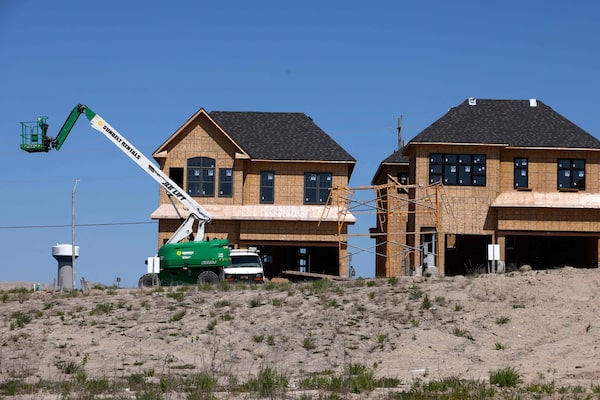
A housing development on the edge of the Ontario Green Belt in the Greater Toronto Area of Bradford West Gwillimbury, Ont., on May 25.COLE BURSTON/AFP/Getty Images
Exorbitant construction costs for residential real estate across much of Canada are exacerbating the country’s housing affordability crisis and creating maintenance and insurance headaches for homeowners.
The cost of building homes and apartment complexes across 11 major Canadian cities was up 54 per cent in the first three months of 2023 compared with the same period in 2019, according to Statistics Canada data released last month.
Building costs rocketed up during the pandemic and continue to head upward, industry watchers say. Even as the supply chain snags linked to COVID-19 ease off, labour shortages persist, materials are still expensive and rising interest rates have increased financing costs for developers. At the same time, demand for new housing remains strong amid record immigration and a resilient economy.
Lofty home building expenses are trickling down to both buyers and owners. For those hoping to buy a home, high building costs are pushing up already stratospheric real-estate prices in many parts of the country. They’re also discouraging some developers from starting on new construction, complicating efforts to ramp up home building and ease the country’s current housing shortage.
For those who already own a home, the trend generally means higher price tags for anything from building a new deck to fixing a leaky roof – and that’s assuming someone is available for the job in the first place. High building costs are also putting upward pressure on home insurance premiums. Those who have an older home may want to review their policy: The cost of rebuilding may have risen beyond their coverage cap, experts warn.
The increases are especially striking in Toronto, with costs up around 85 per cent for single-detached houses and townhomes, and 64 per cent for apartment buildings. But costs for residential real estate overall were also up by 64 per cent in Calgary and around 60 per cent in Edmonton and the Ottawa-Gatineau region, according to Statscan’s building construction price index, which captures the value of materials, labour, equipment, overhead and profit for developers constructing a new building.
Not everyone agrees on the exact magnitude of those increases, which are notoriously tricky to gauge. David Schoonjans, senior director of development advisory at real estate firm Altus Group, said data collected by his company on construction costs for condominiums shows a lower overall increase, with appreciation rates moderating after the pandemic.
But “keep in mind that prices haven’t gone down, they’re still going up – just going up at a slower pace,” Mr. Schoonjans said. Even if costs stopped rising, they’d be plateauing at “obscenely expensive prices,” he added.
The cost of materials for a typical 2,400 square feet home is around $67,000 higher than it was pre-pandemic, with lumber alone accounting for roughly $24,000 of that, said Kevin Lee, chief executive officer of the Canadian Home Builders’ Association, citing a national average.
The higher construction costs are contributing to higher prices for new buildings, which, in turn, also affects the value of existing homes, as “they’re all selling into the same market,” Mr. Schoonjans said.
But developers’ ability to pass on at least some of the extra costs has limits. With pricier mortgages making it harder for prospective buyers to absorb higher home prices, some builders are refraining from starting new projects on which they wouldn’t be able to turn a profit at the moment, Mr. Schoonjans said.
Expensive materials also make for higher overhead for small independent contractors and trades workers, said Richard Lyall, president of the Residential Construction Council of Ontario. That increases the financial incentive for contractors to take on bigger and more lucrative projects over small home repairs in a market where owners are already struggling to find tradespeople, he added.
Insurers are feeling the pinch as well. It’s not just that pricier materials lead to higher claim costs: The scramble to line up workers can both push back and raise the cost of major repairs covered by insurance or of rebuilding a home after an accident or natural disaster.
Delayed repairs can sometimes lead to additional damage as well as extended periods of renting by the owner if the home isn’t habitable, said Rhonda Kelly, vice president of the Insurance Brokers Association of Nova Scotia. Those costs also add up for insurers, she said.
Increased claim costs, in turn, tend to push up insurance premiums. While it’s difficult to quantify the potential increase, “the insurance industry continues to face replacement cost claims nearly twice the rate of inflation and longer cycle times to complete repairs,” said Anne Marie Thomas, director of consumer and industry relations at the Insurance Bureau of Canada in an e-mail.
For some households, though, a bigger risk lurks. In some cases, it’s possible that sky-high costs have pushed the price tag associated with rebuilding a home after events such as a devastating fire or flood beyond the owner’s coverage cap.
While insurers adjust the home building value of a property every year to account for cost changes, sometimes those increases aren’t enough. Luckily, for the majority of homeowners, that isn’t an issue, according to Ms. Thomas. Most insurance policies provide something called “guaranteed replacement cost,” which allows you to rebuild your home, even if the damage exceeds your policy’s limits.
But Canadians with older homes and structures such as barns and sheds who don’t qualify for such coverage could find themselves underinsured, Ms. Thomas cautioned.
“It’s important for homeowners to understand what their policy covers and have a conversation with their insurance professional,” she said.
Are you a young Canadian with money on your mind? To set yourself up for success and steer clear of costly mistakes, listen to our award-winning Stress Test podcast.
 Erica Alini
Erica Alini